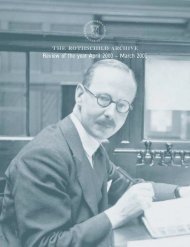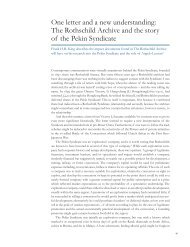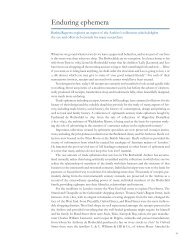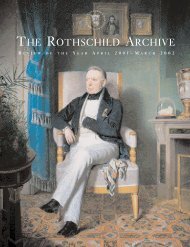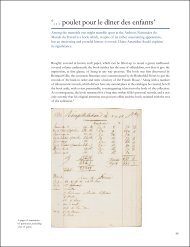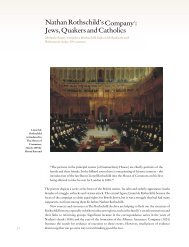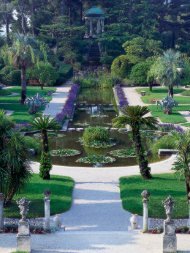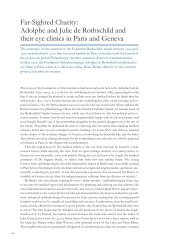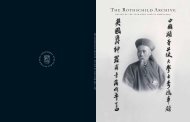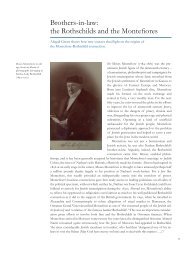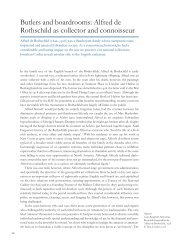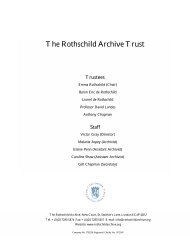66900 Rothschild Archive - The Rothschild Archive.
66900 Rothschild Archive - The Rothschild Archive.
66900 Rothschild Archive - The Rothschild Archive.
Create successful ePaper yourself
Turn your PDF publications into a flip-book with our unique Google optimized e-Paper software.
thirteen tranches of 6 per cent United States stock, amounting to 50,000<br />
dollars in all, that were purchased in the period from January to October<br />
1849.⁹ In April 1849, for 135,000 francs, Herzen also bought a house in<br />
Paris, in the rue Amsterdam, as an investment and to let.<br />
It can be argued, of course, that it was only prudent of Herzen to<br />
use the best advice available to him to preserve his wealth in a time of<br />
political instability and financial uncertainty (although the same argument<br />
could be mounted in defence of any member of the bourgeoisie,<br />
which Herzen was collectively vilifying for its mercenary mentality).<br />
Herzen himself took pains to present his activity in the financial markets<br />
as not merely sensible but at bottom altruistic, as a means of ensuring<br />
that he could help friends in need (xxiii, 126). And yet he evidently<br />
relished his forays into the capitalist world and had few qualms about<br />
them. He has decided ‘to enter into a little commercial matter’, he tells<br />
Kliuchariov, because ‘[T]he profits that are to be had here now for cash<br />
are beyond what one could believe’ and it would be ‘shameful’ not to<br />
grasp them (xxiii, 115, 124). Flushed with the success of his speculation,<br />
he joked that he must seem like a ‘banker’ (xxiii, 134). As for <strong>Rothschild</strong><br />
and his ilk, who eschewed what to them were small transactions, he was<br />
rather in awe of them (xxiii, 124).<br />
By the late autumn of 1849, though, Herzen needed more from<br />
<strong>Rothschild</strong> than advice on the best means of extracting profit from capital.<br />
He also needed help in recovering those remaining Russian assets<br />
(chiefly his estate in Kostroma Province and the 106,000 silver roubles<br />
that his mother had inherited from his father) on which the Russian authorities had placed a<br />
distraint in July of that year, after they had become aware of the movement of Herzen’s and his<br />
mother’s other assets. ₁ ⁰<br />
Herzen learned of the distraint rather belatedly, in October 1849. On receiving the news,<br />
which was to cause him great inconvenience and anxiety over some nine months, he wrote from<br />
Geneva to the wife of Herwegh, with whom he was still on excellent terms, asking her to have<br />
a mutual friend, the Polish dramatist Edmond Chojecki, go to <strong>Rothschild</strong> to discuss a ruse to<br />
recover the estate:<br />
James de <strong>Rothschild</strong>,<br />
founder and head of the<br />
Paris <strong>Rothschild</strong> bank,<br />
in a photograph by<br />
Bingham of Paris.<br />
Edmond must go to <strong>Rothschild</strong>s, Edmond must see the honourable Schaumbourg again<br />
and put this question to him ([or] better still address it to <strong>Rothschild</strong> himself). ‘Mr H owes<br />
Mrs Haag 100,000 or 120,000 roubles in assig[nats]. ₁₁ Mrs Haag has an acknowledgement<br />
of debt from Mr H that she would like to surrender to Mr <strong>Rothschild</strong> in order to have the<br />
immovable property that belongs to H in Russia sold. Mr <strong>Rothschild</strong> will not pay until he<br />
has received the money, but he will issue H with a certificate signed by him; H for his part<br />
will do everything within his power to expedite this sale in Russia?’ (xxiii, 204)<br />
On 6 November, by which time Chojecki had evidently carried out Herzen’s instructions,<br />
Herzen wrote to James direct, proposing this means of forcing the sale of his estate, appealing<br />
to the banker as a man of honour, and expressing his willingness to accept whatever charges<br />
and conditions James might demand for his services. ₁ ²<br />
James evidently saw no prospect of recovering the Kostroma estate but he did think it possible<br />
to recover the value of Luise Haag’s bond (xxiii, 222–223). He therefore took the matter<br />
up through Gasser, who even succeeded in obtaining an interview with the Russian Minister of<br />
Foreign Affairs, Count Nessel´rode, one of several very high-ranking Russian personages who<br />
now became embroiled in the affair. <strong>The</strong> Russian authorities refused to remove the distraint on<br />
the estate, just as <strong>Rothschild</strong> had predicted. However, they did come to the conclusion that it<br />
42



